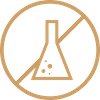Vitamin C is involved in numerous redox reactions in the human body as an antioxidant and cofactor, which means it influences numerous processes such as antioxidant cell protection, the immune system and energy metabolism. It is also involved in the formation of the structural protein collagen (skin, cartilage, bones, blood vessels) and the synthesis of hormones.
Higher concentrations of vitamin C are naturally found in fresh fruit, vegetables and berries such as camu camu, sea buckthorn berries, acerola cherries, rose hips, blackcurrants, kale, parsley, kiwis and citrus fruits.
Potassium is the third most abundant mineral in the body and is one of the essential (vital) electrolytes. Around 98% of all potassium in the human body is found intracellularly, i.e., inside the cell, while its important counterpart, sodium, is mainly concentrated extracellularly. A balanced ratio of these two minerals is an important basis for a large number of bodily reactions and (enzymatic) metabolic processes. However, our modern, high-salt diet easily shifts the balance towards a sodium surplus. Excess sodium also favours the excretion of potassium via the kidneys. Increased sport and everyday stress also increase the overall need for minerals and as potassium cannot be stored in the body, we are dependent on a sufficient daily supply of the mineral in order to maintain the balance of important body systems.
Potassium ascorbate is the potassium salt of ascorbic acid (vitamin C) and occurs naturally in many types of fruit.
Health claims for vitamin C (according to EFSA):
Vitamin C contributes to
- The reduction of tiredness and fatigue
- Normal cognitive function
- The regeneration of the reduced form of vitamin E
- Normal energy metabolism
- Normal immune system functioning
- Normal nervous system functioning
- The protection of cells against oxidative stress
- Normal collagen formation for normal blood vessel function
- Normal collagen formation for normal bone function
- Normal collagen formation for normal cartilage function
- Normal collagen formation for normal dental function
- Normal collagen formation for normal gum function
- Normal collagen formation for normal skin function
- Increasing iron absorption
- Maintaining normal functioning of the immune system both during and after intense physical activity
Health claims on potassium (according to EFSA):
Potassium contributes to
- normal function of the nervous system,
- to normal muscle function,
- to the maintenance of normal blood pressure.






















